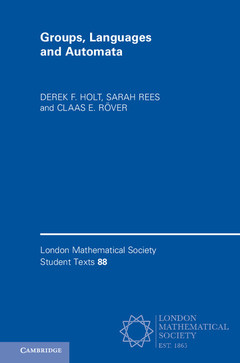Description
Groups, Languages and Automata
London Mathematical Society Student Texts Series
Authors: Holt Derek F., Rees Sarah, Röver Claas E.
A reference book discussing applications of formal language theory to group theory, particularly geometric and computational group theory.
Language: English
Subject for Groups, Languages and Automata:
Approximative price 45.81 €
In Print (Delivery period: 14 days).
Add to cart
Groups, Languages and Automata
Publication date: 02-2017
306 p. · 15.2x22.7 cm · Paperback
Publication date: 02-2017
306 p. · 15.2x22.7 cm · Paperback
Approximative price 119.03 €
In Print (Delivery period: 14 days).
Add to cart
Groups, Languages and Automata
Publication date: 02-2017
Support: Print on demand
Publication date: 02-2017
Support: Print on demand
Description
/li>Contents
/li>Biography
/li>
Fascinating connections exist between group theory and automata theory, and a wide variety of them are discussed in this text. Automata can be used in group theory to encode complexity, to represent aspects of underlying geometry on a space on which a group acts, and to provide efficient algorithms for practical computation. There are also many applications in geometric group theory. The authors provide background material in each of these related areas, as well as exploring the connections along a number of strands that lead to the forefront of current research in geometric group theory. Examples studied in detail include hyperbolic groups, Euclidean groups, braid groups, Coxeter groups, Artin groups, and automata groups such as the Grigorchuk group. This book will be a convenient reference point for established mathematicians who need to understand background material for applications, and can serve as a textbook for research students in (geometric) group theory.
Preface; Part I. Introduction: 1. Group theory; 2. Formal languages and automata theory; 3. Introduction to the word problem; Part II. Finite State Automata and Groups: 4. Rewriting systems; 5. Automatic groups; 6. Hyperbolic groups; 7. Geodesics; 8. Subgroups and co-set systems; 9. Automata Groups; Part III. The Word Problem: 10. Solubility of the word problem; 11. Context-free and one-counter word problems; 12. Context-sensitive word problems; 13. Word problems in other language classes; 14. The co-word problem and the conjugacy problem; References; Index of notation; Index of names; Index of topics and terminology.
Derek F. Holt is a professor of mathematics at the University of Warwick. He authored the successful Handbook of Computational Group Theory, which has now become the standard text in the subject, and he co-authored The Maximal Subgroups of Low-Dimensional Groups (with John N. Bray and Colva M. Roney-Dougal, Cambridge, 2013). Holt was also one of five co-authors of the seminal book Word Processing in Groups (1992) on the theory of automatic groups, and has contributed mathematical software to the Magma and GAP systems. In 1981, he was awarded the London Mathematical Society Junior Whitehead Prize.
Sarah Rees is a professor of pure mathematics at the University of Newcastle upon Tyne. She is an active researcher in the fields covered in this book, and has supervised a number of graduate students in this area.
Claas E. Röver is a lecturer in mathematics at the National University of Ireland, Galway. He began researching the topics covered in this book during a post-doctoral position in Newcastle and has since contributed to the rapid development of this area of mathematics.
Sarah Rees is a professor of pure mathematics at the University of Newcastle upon Tyne. She is an active researcher in the fields covered in this book, and has supervised a number of graduate students in this area.
Claas E. Röver is a lecturer in mathematics at the National University of Ireland, Galway. He began researching the topics covered in this book during a post-doctoral position in Newcastle and has since contributed to the rapid development of this area of mathematics.
© 2024 LAVOISIER S.A.S.

